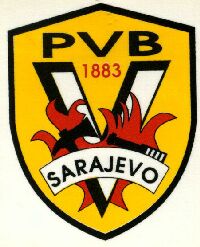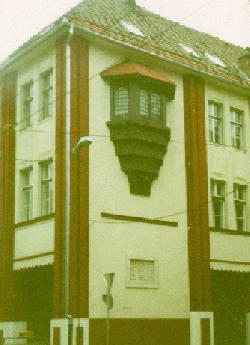
![]()
Profesionalna vatrogasna brigada Sarajeva

![]()
Profesionalna vatrogasna brigada Sarajeva
Helaas is onze Nederlandse vertaling verloren gegaan in de strijd.
M: Can you tell us about the situation at the moment Dayton agreement was signed?
H: They’ve had over 5000 intervenes under very difficult conditions During the war among their workers they’ve had 8 killed, 48 wounded. Around 90 % of their vehicles were destroyed during war.As the professional firebrigade unit I don’t see that something has changed for us or moved better. We are mostly financed by the Canton of Sarajevo. Our work covers the area of Canton Sarajevo, which includes 6 -7 municipalities, and they we several substations within the Canton. The Dayton agreement didn’t bring us any concrete aid nor we know of someone who would be interested in helping us. So, it is from what we manage to save from our budget we get from the Canton, that we buy some equipment.
M: Can you tell us a little about the situation right after the Dayton agreement, about what was your job? I heard about enormous number(amount) of gas leaks and accidents because of that. So can you tell us how the firebrigade, as it is now, started just after Dayton started?
H: After Dayton we have managed to solve the number of people that is required for our everyday services. We now have 230 employees in seven stations and substations.
M: When you work in possible mine field areas, do you also work with SFOR?
H: We don’t have cooperation with SFOR, we believe that they don’t know many things. I mean, people that work in local police stations also know where the front lines were, and they lead us as far as we can go to be safe because they know the terrain in which they work. In most cases we use asphalt roads or those roads that are confirmed safe. As far as we can get to safely is as far as we go.
H: During the last half of the year period we have made contacts with all other firebrigades from the Federational part of BiH, and they are mostly facing similar problems.
M: As you said the Dayton agreement didn’t bring any, let’s say support for you to build up. Is the Canton the only institute that supports you or did you get some support from the firebrigades from the international community?
H: As far as some humanitarian organisations are concerned, during the war we’ve been supported by ODA, firebrigades from America, France, Italy and Wienna. They were supplying us with some equipment, and we are grateful for that, just that the equipment was old and quite used.
H: Only concrete help we got in the past was about 70,000DM from the World Bank, but that was based on the fact that we’ve employed130 demobilised soldiers, and they support firms providing more jobs. Those men, employed 1.1/2 years ago, have been trained, equipped by us and they passed exams(tests), so they are now regular employees of the Brigade.
Since we, as a firebrigade, are going to take the Sarajevo Airport as our responsibility, we will employ 30 more men, also train them etc., and we expect the World Bank to support us on that as well.
M: And the last question is what are your priorities now towards the future, how to improve even more the situation?
H: Our main priorities are towards renewing the equipment that we have. On the weekly meetings of the Brigades command staff we bring out our problems and suggestions, and we’ve agreed on such approach that we’ll thank every organisation that helps us or wants to help us, but it really doesn’t suit us that we get old and worn-out equipment. We’ll ask someone that is able to help us, to see and to speak with us about our real needs. It’s better for us to get one new and proper bowel than twenty worn-out ones, or old boots and uniforms, or even twenty-twenty five years old vehicles which we can’t use and find spare parts for. It is expensive for us to maintain old vehicles working. And because all of this it is better for us to get one new thing that we really need than more things that will cause us more problems than benefit.
M: Those were all the questions we had. Is there anything else that you would like to say?
H: Recently a documentary movie was made as presentation of their work. It will be in English as well as in Bosnian.(It is in the montage process). If this interview is going to be shown somewhere that it could be seen by our possible future supporters, I would like to thank you for giving us such an opportunity.
Since the gasification problem is not yet solved, we had to intervene several times, and there are still some improvised gas connections. But our greatest problem was intervening in the outskirts and suburbs of the city, in forest areas, and especially on ex front lines where mine fields are. In that case we have also a problem of accessing those parts of Canton - we then must have police escort and know at least what they know about mine fields on that terrain. M: Do you know if that is the same in other parts of Bosnia?
M: Do you know if that is the same in other parts of Bosnia?
I mean-to build up this building, then cars, equipment and uniforms, is that only from Canton Sarajevo?
Meanwhile, the Canton as institution is obliged to take care of our Brigade in terms of financing us to equip ourselves, provide uniforms etc. I will tell you how we’re managing. We get our monthly budget, and what we manage to save of it - we use to sew some new uniforms, next month maybe we buy some boots, etc. And that is the way we mostly use for equipping ourselves.
And to give you a straight example - last month we got the finances to buy a vehicle for our special needs which costs 300,000DM. That’s a regular price for such a vehicle in Europe and the rest of the world. But we are not going to buy one complete vehicle, we’re going to buy a chassis of the vehicle, bring it to Visoko, build it up and make a vehicle that completely fits our requirements. And by having it done so, we’ll be able to have two vehicles for 300,000DM which in Austria, for example, would be the price of only one.